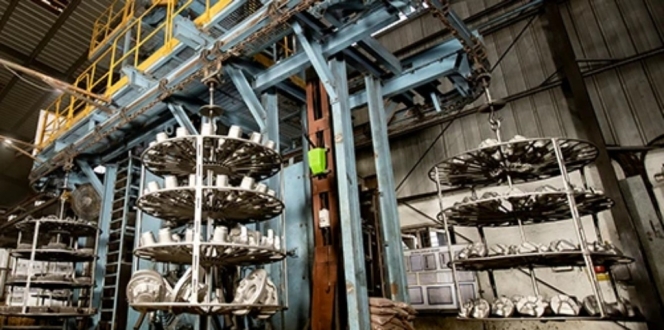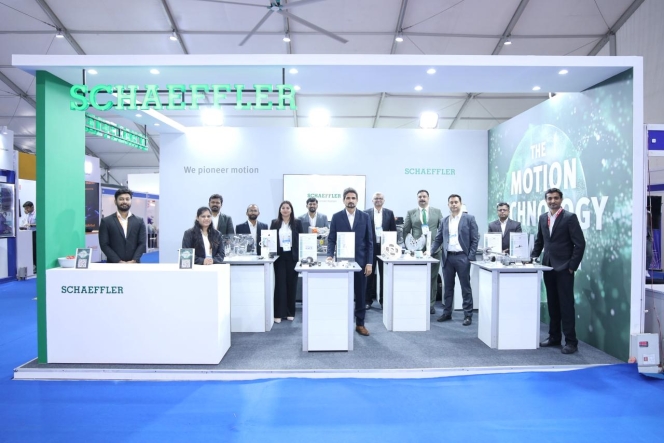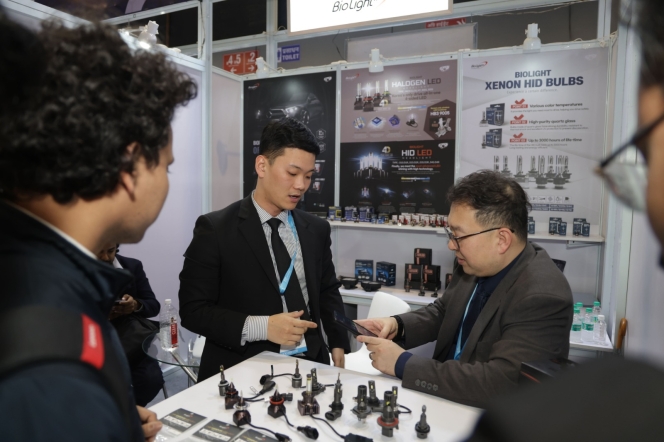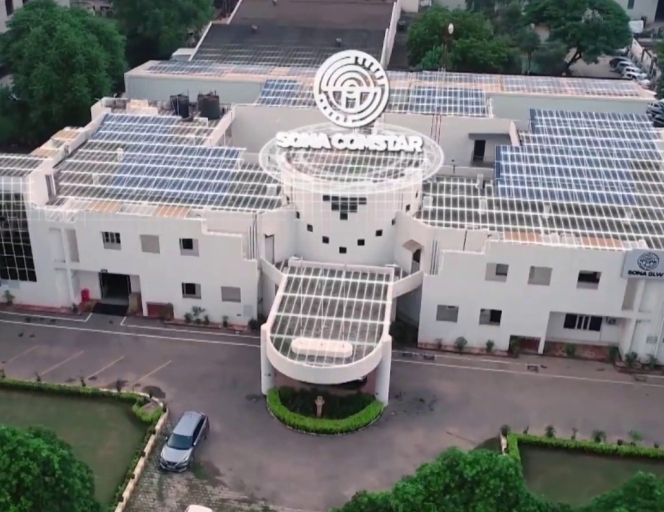RSB Group Celebrates 50th Anniversary
- By MT Bureau
- November 16, 2024
RSB Group, one of India’s largest automotive component manufacturers, is celebrating its 50th anniversary and has plans to honour the decades of innovation, resilience and growth by achieving 3X growth in the next three to four years.
RSB Group was founded by brothers R K Behera and S K Behera in 1974 with just INR 200,000, which included a state subsidy for Technocrats for INR 20,000. The company has now expanded into an INR 30 billion-plus industry major, employing more than 6,000 people, and plans to celebrate the 50-year milestone by focusing on surpassing the INR 100 billion revenue mark before launching an IPO in the next 3-4 years.
These expansion aspirations will be greatly aided by a recent strategic alliance with Bain Capital, which made an investment in RSB a few months ago. With a strong emphasis on global markets, especially when it comes to growing operations in Mexico, this partnership will help both organic and inorganic growth. At the moment, RSB runs two factories abroad, 17 manufacturing sites in India and a tech subsidiary called I-DESIGN Engineering Solutions Ltd in Pune. Major domestic and foreign customers of the firm include Ford, Fiat, Isuzu, Cummins, John Deere, Volvo, Renault Nissan, JCB, Ashok Leyland, Mahindra & Mahindra and Tata Motors.
Early difficulties notwithstanding, RSB's journey acquired tremendous impetus with a crucial contract from Tata Motors, which resulted in growth of almost 75 percent annually until 1990 and a steady 25 percent CAGR after that. In order to give OEMs a comprehensive solution and establish itself as a powerful player in the e-mobility industry, RSB is also investing in the electric vehicle (EV) market as part of its sustainable growth plan. RSB is working with an Israeli startup to create EV solutions, such as controllers, motors, and e-axles. Over the next five years, the business plans to generate 25 percent of its income from EV components and 75 percent from conventional car components as part of a strategic revenue mix.
R K Behera, Chairman, RSB Group, stated, “Looking back on 50 years of RSB, I am deeply grateful for the journey we’ve taken. The celebration is not just about marking a milestone; it’s a tribute to the humble beginning, to the dedication and shared values that have brought us here. This journey wasn’t one I took alone; it was built alongside my brother, S K Behera, whose support and determination carried us through our most challenging times. In the beginning, we faced intense struggles – limited resources, financial setbacks and constant hurdles – but with SK by my side and the unyielding spirit of our employees, we persisted. Every success is truly a testament to the sacrifices, resilience and dedication of our RSB parivar. As we look forward, I urge our next generation to hold fast to these values of integrity, quality and respect. They are also expected to have a strong focus on sustainability. Together, we have not only achieved growth but also built a legacy that we can proudly pass on, impacting our communities and industry for years to come.”
S K Behera, Vice Chairman, RSB Group, said, “Our journey from a small workshop to an industry leader with an INR 30 billion-plus revenue base has been one of resilience, strategic vision and a focus on excellence. From the earliest days, we were guided by the belief that taking care of our people would allow us to achieve remarkable things. Every milestone reflects the hard work, talents and sacrifices of our employees, whose dedication and commitment have driven RSB forward. As we now embrace new opportunities – from electric vehicle technology to expanding into international markets – our focus remains on building with integrity and quality. Looking to the future, we will continue setting new industry standards, not just for growth but for creating lasting value and impact in every market we enter. We are exploring a few opportunities, and a decision will be taken in a few months.”
Bharat Forge Subsidiary JS Auto Cast Secures INR 3 Billion From Premji Invest
- By MT Bureau
- February 02, 2026

JS Auto Cast Foundry India (JSA), a subsidiary of Bharat Forge, has raised INR 3 billion crore in equity from Premji Invest (PI). Following the primary infusion of capital, Premji Invest will hold a 23 percent stake in the company on a fully diluted basis.
JSA is a supplier of ferrous castings for the industrial and automotive sectors. The company intends to use the capital to expand casting capacity, invest in medium casting capabilities, and pursue industry consolidation through acquisitions.
Since its acquisition by Bharat Forge in 2022, JSA has reported growth in revenue, exports, and profitability with a Compound Annual Growth Rate (CAGR) of 17 percent, 24 percent and 25 percent respectively.
Amit Kalyani, Vice Chairman & Joint Managing Director, Bharat Forge, said, “Since 2022 when we acquired JSA, the company has delivered excellent financial performance with topline, exports and profitability growing at a CAGR of 17 percent, 24 percent and 25 percent respectively, while enhancing its product mix and customer base. We are delighted to partner with Premji Invest (PI), a renowned and highly respected investor, in the next phase of JSA’s growth journey.”
The investment aligns with Premji Invest’s strategy of collaborating with engineering and manufacturing conglomerates on growth and consolidation initiatives.
Manoj Jaiswal, Partner, Premji Invest, said, “We are excited to partner with Bharat Forge, a premier engineering and manufacturing conglomerate in the country. Collaborating with leading conglomerates on their growth and consolidation journey is one of our strategic pillars. Through our investment in JSA, we look forward to jointly building a leading ferrous casting platform in the country.”
- Schaeffler India
- Symposium on International Automotive Technology
- SIAT 2026
- Deepak Kasturi
- Madhurisha VIppatoori
- Harsha Kadam
- Viswanathan Sambasivam
- Omkar Kulkarni
Schaeffler India Showcases Next-Gen Product Portfolio At SIAT 2026
- By MT Bureau
- January 28, 2026

Tier 1 supplier Schaeffler India is showcasing a range of motion technologies at the Symposium on International Automotive Technology (SIAT) 2026. The company's exhibit at Hall Zone D includes electrification solutions such as drives, motors and modules, alongside powertrain systems for internal combustion engines and hybrid vehicles.
The portfolio on display features chassis components, sensors, fuel delivery modules, and bearings designed to reduce friction in vehicles. The company is highlighting its local engineering capabilities and its work with manufacturers to develop mobility solutions within India.
Company executives are participating in the symposium's technical programme. Madhurisha Vippatoori, Chief Technical Officer, is chairing the Testing and Evaluation track. Deepak Kasturi, Head of Innovation India, is delivering a keynote address regarding Euro 7 standards and real-time emissions monitoring.
The company stated that its presence at the event reflects its focus on engineering innovation, energy efficiency and collaborative development with automotive customers and academia.
Harsha Kadam, CEO & MD, Schaeffler India, said, “As a leading mobility solutions provider in India, we at Schaeffler are proud to be associated with all the leading automotive customers in shaping the future of mobility. We are equally committed to supporting our customers across various types of powertrains that will support cleaner, electrified, and intelligent mobility. Together, we are shaping a more secure, sustainable, and future-ready India.”
Viswanathan Sambasivam, Division Head - Powertrain & Chassis India, said, “SIAT provides an ideal platform to demonstrate how we are shaping mobility for India. Our focus is on co-engineering with OEMs, accelerating technology transfer, and strengthening local value creation. The solutions we are bringing this year represent the next step in advancing clean, safe, and smarter mobility.”
Omkar Kulkarni, Division Head - E-Mobility India, said, “India is one of our most important engineering hubs. Our teams here are working closely with customers to design for India, build in India, and innovate for India. The technologies displayed at SIAT underline our ability to combine global expertise with local development capabilities.”
Indian Auto Component Industry Set To Showcase Its Prowess At ACMA Automechanika New Delhi 2026
- By MT Bureau
- January 28, 2026

The Indian automotive component industry was valued at USD 80.2 billion in FY2025, with the aftermarket segment contributing USD 11.8 billion. Data from the Automotive Component Manufacturers Association of India (ACMA) indicates the sector grew by 6.8 percent to reach USD 41.2 billion in the first half of FY2026. Industry projections suggest the component market will reach between USD 111 billion and USD 200 billion by 2030.
Against this growth, the ACMA Automechanika New Delhi 2026 trade fair will take place from 5 to 7 February 2026 at Yashobhoomi, New Delhi. Organised by Messe Frankfurt Trade Fairs India and ACMA, the event will host more than 870 exhibitors. The fair serves as a platform for manufacturers, distributors and service providers to showcase innovations in spare parts, electronics, diagnostics and workshop equipment.
The exhibition will feature participation from 20 countries, including Germany, Japan, Korea and the USA. Dedicated pavilions will highlight technologies from nations such as China, Italy and Taiwan. The event focuses on electrification, alternative fuels and digital authentication. Exhibitors will display ethanol-ready components, hydrogen systems and electric vehicle charging solutions.
Raj Manek, Executive Director and Board Member of Messe Frankfurt Asia Holdings, said, “As India prioritises quality-led development across sectors, ACMA Automechanika New Delhi 2026 will showcase how the auto components and aftermarket industry is advancing in sync with global trends. The show will unite visitors and exhibitors in a massive international gathering, converging cutting-edge innovations, sustainable component solutions and clean-fuel ecosystems. Global participants are increasingly drawn to India's pivotal role in this transition, with organisations showing strong enthusiasm for tech-driven solutions to combat climate change and build a thriving and a cleaner future”.
Vinnie Mehta, Director General of ACMA, added, "India’s automotive aftermarket is moving towards a more structured, quality-driven and globally aligned future. The auto component industry grew by 6.8 percent to USD 41.2 billion in the first half of FY26, supported by stable domestic demand, a resilient aftermarket and sustained investments in capacity expansion, localisation and technology upgradation. ACMA Automechanika New Delhi provides an important platform for industry stakeholders to engage with emerging technologies, regulatory developments and global market opportunities”.
Sona Comstar Reports 39% Revenue Growth In Q3 FY2026
- By MT Bureau
- January 23, 2026

Sona BLW Precision Forgings (Sona Comstar) has announced its financial results for Q3 FY2026, reported revenue of INR 12.09 billion, a 39 percent increase YoY.
The company’s EBITDA grew by 25 percent to INR 3.2 billion with a margin of 25.2 percent, while net profit rose by 20 percent to INR 1.8 billion. Revenue from Battery Electric Vehicles (BEV) represented 38 percent of total turnover.
In the first 9-months of FY2026, the company secured six new programmes, bringing the total to 65 across 33 different customers. Additionally, Sona Comstar was awarded a programme from a new customer to supply hydraulic motor controller.
Vivek Vikram Singh, MD & Group CEO, Sona Comstar, said, “We achieved our highest-ever quarterly revenue, EBITDA, and adjusted net profit in Q3 FY2026. Our revenue grew strongly by 39 percent YoY, primarily driven by the expansion of our electric vehicle traction motor and railway business in India. BEV revenue share improved meaningfully to 38 percent in Q3 from 32 percent in Q2FY2026 and represents our second-best quarter till date in terms of absolute BEV revenue and share. We have commercialised a new product in this quarter, the hydraulic motor controller, leveraging our strengths in motors and controllers to develop the solution for a new application outside the current product portfolio. We continue to add new EV customers and win new EV programs from our existing EV customers. Moreover, we commenced sample production of in-cabin radar sensors in our new SMT line at Chennai facility in this quarter, making us one of the few automotive radar manufacturers in India with local SMT manufacturing capability.”







Comments (0)
ADD COMMENT